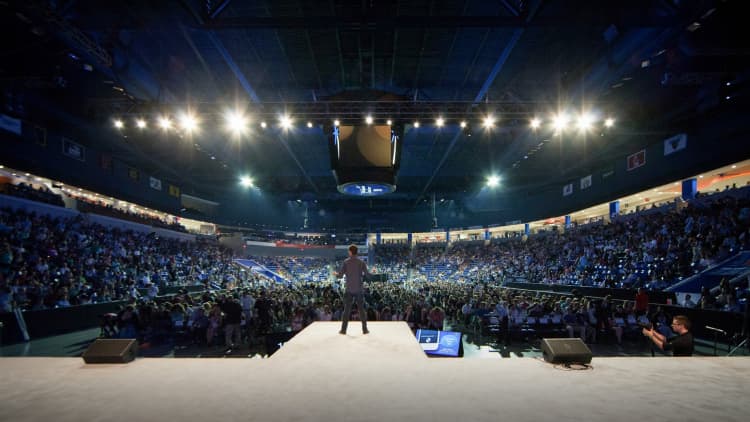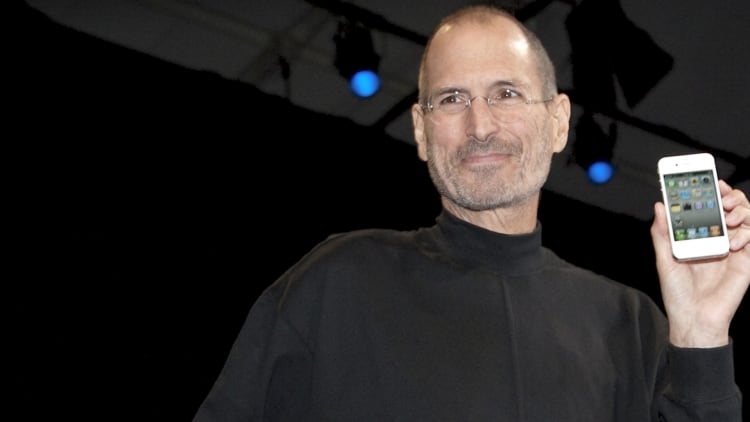There is perhaps no greater achievement in the world of Silicon Valley entrepreneurship than to have been courted by the late, iconic titan of Apple, Steve Jobs.
So, what's that like? What happened when Steve Jobs wanted your company? Adam Cheyer, the co-founder of Siri, knows.
Two weeks after Cheyer and his co-founders, Dag Kittlaus and Tom Gruber, launched Siri as an app in the Apple store in February 2010, Jobs called their office — unannounced.
"We had no idea. I mean literally he called our CEO's phone," says Cheyer, referring to then CEO Dag Kittlaus.
"[Dag] tells this funny story — I don't know if you've ever had the moment where, you know, the phone is ringing and you swipe to answer and it doesn't pick up? And [it says] 'Apple' on [Dag's] phone, and he's swiping and he's trying to get it to answer. And then finally he answers, and there was Steve on the line," says Cheyer, speaking to CNBC.
The conversation was remarkably low key and started with a scheduling snafu.
Jobs said, "Hey, it's Steve, come over to my house tomorrow. What'cha you doing?" according to Cheyer.
"Our CEO says, 'No, I can't, I'm taking my wife to the to the ballet,'" remembers Cheyer.
Luckily, Jobs wasn't easily deterred: "Really? Well you could come over before," said Jobs.
"And so we did," says Cheyer.
[Steve Jobs] ... was absolutely filled with passion and a determination and a fire like I've never seen.Adam Cheyerco-founder of Siri and Viv Labs
In that first meeting, Jobs made it clear that he wanted to buy Siri, but the co-founders declined. "With no hesitation, we said we were flattered but that we weren't looking to sell at that time," says Cheyer.
"We had just raised a new round of funding and had gone through a successful launch. We also had large distribution plans ahead, so an acquisition was just not something we were actively seeking or thinking about at the time."
A few months later, in April of 2010, the Siri team changed its mind and did sell to Apple for a reported $200 million.
"Over multiple discussions, Steve later convinced us that he understood our vision, that he wouldn't just make Siri a tiny feature but something core to Apple's strategy across multiple devices, and that we could impact the world more as part of Apple than as an independent company," says Cheyer.
A pre-Siri prototype before the iPhone.
In his dealing with Jobs, Cheyer learned that the tech icon never shied away from sharing his opinions.
"Even the very first day we got into — not an argument — but he's like, 'Well what would you do in this case?' and I gave an answer, he's like, 'No! No! No! Why?' And so we were going at it on our very first meeting," remembers Cheyer.
Though he was insistent on being heard, Jobs would also respect a well-thought out opinion.
"If you had the right ideas and foundation to back up your perspective, he was always open to to hearing other ideas and thinking maybe he's not right," says Cheyer. "And that's the thing I love most about him. If you couldn't back up your assertion, he would dismiss you as a fool or something like that, but he was always open to hearing another idea and to learning from that."
Siri launched on the iPhone on October 4, 2011. Jobs died the next day.
Working with Jobs had an impact on Cheyer.
"My impression was that he was absolutely filled with passion, and a determination and a fire like I've never seen. And I remember thinking, he's a billionaire, he's already transformed a few industries — music and movies and computing — you know, he could he could relax a little bit, and there wasn't anything relaxed about him. He was desperate to be right and to advance and to learn and I loved it," says Cheyer.
See also:
How to find your superpower, according to a 26-year-old CEO and self-made millionaire




